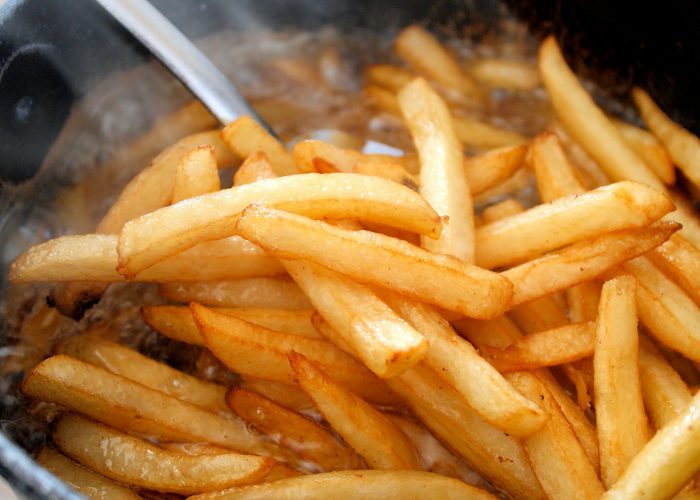Occasional acid reflux, commonly known as heartburn, is a frequent medical complaint for many Americans. The condition originates from issues with a ring of muscle found at the end of your esophagus, at the entrance to your stomach.
This ring of muscle is referred to medically as the Lower Esophageal Sphincter (LES). If the LES does not close fully and immediately after food has passed through it, or is triggered to open more often than it should, acid from the stomach can move up into the esophagus. This causes the classical ‘burning’ sensation in the chest and throat which we associate with acid reflux.
Though over-the-counter medications known as antacids are available to treat acid reflux, there are some natural remedies you might want to consider first. Keep reading to learn about 14 natural ways to treat acid reflux.
Symptoms of Acid Reflux

Symptoms of acid reflux vary between individuals: heartburn is the classical symptom and has become the most commonly used way of describing acid reflux. Heartburn is an uncomfortable burning sensation in the chest and often occurs after eating. Other common symptoms include a sour taste in the back of your mouth caused by stomach acid reaching the tongue; a sore, inflamed esophagus; bad breath, excessive bloating or belching; feeling or being sick; and pain and/or difficulty when swallowing.
According to NICE guidelines[1], if these symptoms occur more than twice a week, an individual can be classified as having GERD (Gastro-Esophageal Reflux Disease). GERD can lead to chronic symptoms and damage the cells lining the esophagus, resulting in life-long eating difficulties and increased risk of further infection/damage. If you are experiencing heartburn symptoms several times a week, are having trouble swallowing, or are suffering more severe symptoms such as vomiting blood or unexplained weight loss, seek the attention of a physician.
Causes of Acid Reflux

The cause of acid reflux can range from serious genetic abnormalities in the structure of the throat and stomach to simple, lifestyle factors. While more serious cases of reflux occur and can be linked to anatomical conditions (like hiatus hernia), most of the cases in the United States have a simpler explanation and can be traced to diet and lifestyle.
Acid reflux is generally caused by increased pressure on the stomach[2]. This pressure can be long-term, such as that in obesity, or short-term, often occurring after a large meal. Both long- and short-term factors will play an important role in the regularity and severity of your symptoms. You may have already noticed that eating certain foods can exacerbate symptoms: fatty, spicy or highly-acidic foods (such as citrus fruits) are common triggers of acid reflux. Drinks may also trigger acid reflux or make the symptoms worse: alcohol, coffee, and carbonated drinks are some of the most common ‘trigger’ drinks.
There are a few other contributing factors that may increase the likelihood or severity. Pregnant women are likely to experience acid reflux due to the abdominal pressure caused by the growing fetus, affecting digestive health and function. Similarly, smoking and certain other drugs (primarily those that relax the muscles of the throat like aspirin or ibuprofen) can contribute to poor LOS-reactivity and acid reflux regularity.
Treating Acid Reflux
While it may be second nature to rely on conventional, pharmaceutical medicines to treat acid reflux, many of these solutions aim at resolving symptoms rather than treating the cause of the condition. This is a “band-aid” approach, and may not solve the problem in the long-term. There are other considerations and approaches to treating acid reflux that you can use to improve your comfort and quality of life without medication.
Avoid tight-fitting clothes

If you’re starting to feel the pinch of your waistband, then your clothes are too tight – especially if you’re feeling squeezed after a large, gut-busting meal. This is not only discomfort and feeling a little larger than normal, but restrictive clothing increases the pressure on the abdomen and can make acid reflux more likely and more severe.
Small, frequent meals

Smaller meals will place less stress on the stomach and reduce the likelihood of experiencing heartburn or other acid reflux symptoms. A large meal (one containing a large volume of food) forces the stomach to rapidly expand and places pressure on the lower esophagus, so controlling the size of your meals is an easy way to protect yourself against acid reflux. Eating smaller meals may also be effective at controlling calorie-intake and reducing snacking during the day, which can contribute to losing fat. This fat loss is not only a great way to maintain a healthier lifestyle, but further reduces pressure on the stomach [2].
Eat more slowly

Eating too quickly has a similar burden on the stomach as eating too much. If you eat your food too quickly you will put pressure on your stomach to rapidly expand, causing excess stress to the esophagus and increasing the chances of developing heartburn or other acid reflux symptoms [2].
Your stomach has a general rate at which it can neutralize, digest, and drain foods. If you eat too quickly, you will fill the stomach too quickly and drainage will be poor, resulting in muscle spasms around the esophagus and severe heartburn, whether you are at risk of acid reflux disease or not[3].
Drink more fluids

You probably need to drink more water anyway, but the beneficial effects of water are particularly obvious in the treatment of acid reflux. Water regulates many bodily processes and is heavily involved in the proper digestion of food, as well as muscle health, both of which contribute to reduction in acid reflux symptoms[4]. Drinking water also improves the drainage rate of the stomach [3] and dilutes stomach acid, making it an amazing choice as an accompaniment to meals, or at any time of the day.
Don’t eat too late at night

The digestive system is great at staying closed and regulated, but it is still subject to gravity and the way that you position yourself after a meal has a profound effect on the incidence of acid reflux. Eating before bedtime is likely to increase the odds of poor digestion and heartburn because it slows digestive function. For this reason, you should avoid eating too close to bedtime: ensure there are a minimum of 2-3 hours between your last meal and sleep.
Raise the head of your bed

Speaking of the effects of gravity, if you’re struggling with acid reflux it may be possible to reduce symptoms by simply raising the head of your bed. You can achieve this by placing any object underneath the posts at the head of the bed, and it will contribute to improved stomach drainage. The best approach is to gradually elevate the bed, with a height of around 6 inches being ideal to improve digestive health (and you won’t start sliding out of bed!).
If you don’t want to take a DIY approach to improving your digestive health, be careful to avoid using pillows to simulate the effect. Using pillows to prop yourself up tends to involve rounding the spine, which increases pressure on the stomach and may make acid reflux symptoms even worse.
Avoid trigger foods and drinks

Triggers foods are something that you’ve probably figured out to avoid all by yourself, but there are many that you might not recognize, and they’re all contributing to your overall odds of experiencing unpleasant attacks of acid reflux.
Some of the most common trigger foods include:
- tomatoes, tomato sauce and other tomato-based products
- high-fat foods, such as fast food products and anything deep-fried
- citrus fruit juices (such as orange juice)
- soda, or other carbonated drinks
- caffeine and other mild stimulants
- chocolate and other sugary foods
- garlic, onions and other sharp herbs
- mint
By limiting these foods in your diet or completely removing them, you can reduce the likelihood of acid reflux symptoms. Many of these foods are unhealthy and their elimination from the diet is likely to lead to reductions in body fat and a variety of other improved health markers.
Foods to combat acid reflux

There are no magical foods that cure acid reflux, but there are certain foods that have been shown to have a positive effect on the symptoms. Structuring your meals to contain low quantities of high-quality fats, high protein content, and a healthy amount of dietary fiber (this probably means more). This nutrient profile will improve digestive health and ensure that you’re not overloading your stomach with heavy fats or poor-quality carbohydrates.
Keep a food log

One of the best ways to handle your acid reflux symptoms is to keep a basic food log to try and identify some of your personal triggers and how severe they are. List foods, exercise, and sleep habits as well as when symptoms occur and how severe they are. This will provide you with the tools to identify what foods and habits contribute to your pattern of symptoms and, hopefully, adapt in a way that reduces the regularity and severity of your reflux.
Lose Weight

It’s no surprise that weight loss is on this list: approximately 2/3 of Americans are significantly overweight or obese, which explains why acid reflux is an increasingly serious problem in the United States[5]. Acid reflux is far more prevalent among the overweight and obese, and losing weight is one of the simplest ways to improve your health and wellbeing.
Visceral fat around the stomach and esophagus is a health risk for many reasons, but contributes heavily to acid reflux. Achieving a healthy bodyweight with lower body fat is a great way to improve a whole host of health markers and you should be aiming for a steady, consistent weight loss of around 1 to 2 lbs. per week.
Stop smoking

Just in case you needed another reason to quit smoking! Smoking has been associated with long-term damage to the LES, which is essential for the prevention of stomach acid travelling back up into the esophagus after food enters the stomach. This means that smoking is going to increase the prevalence of acid reflux, as well as damaging the cells in the throat that are necessary for recovering from acid reflux and vomiting[6].
Avoid alcohol

Alcohol can trigger gastro-esophageal reflux in many people through a variety of ways.
Firstly, alcohol acts to as a muscle relaxant and reduced the tone of the LES, allowing stomach contents to reflux back into the lower esophagus. Alcohol also acts to increase the production of stomach acid, as well as increasing the sensitivity of the esophagus to acid. The influence of alcohol on acid reflux can even be as simple as the food choices you make after you’re intoxicated[7].
If you’re looking to unwind after a stressful day, try exercising, meditation, stretching, or deep breathing instead of an alcoholic drink.
Explore potential herbal remedies

According to the Mayo Clinic, certain herbs have been used to treat GERD with some promising results, such as chamomile, licorice, marshmallow (the herb, not the candy!), and slippery elm. These herbs are available in a variety of forms, and herbal teas are a popular choice. A downside to herbal remedies is the lack of medical evidence performed to assess their value as treatments for acid reflux. However, such herbal remedies tend to be safe and the worst-case scenario is often that they don’t work, rather than causing harm. Even so, it is always important to check herbal remedies will not interfere with any medications you might already be taking.
Relaxation techniques

Since esophageal muscles play a large role in keeping stomach acid down in the stomach where it belongs, it may be helpful to learn a few techniques that can relax both your body and mind. Yoga has enormous benefits, promoting mind-body awareness and the control of the muscles of the core and diaphragm, which may play a part in resting abdominal pressure [2].
Clearly, you have more power to combat the symptoms and causes of acid reflux than you might have thought. Alleviating heartburn and GERD can be as simple as improving your lifestyle choices to reduce the cause, while making small changes to relieve the severity and frequency of symptoms.

However, it is important to note that home remedies and lifestyle changes may not be enough in certain circumstances. If your condition is severe or prolonged, GERD and acid reflux can contribute to the development of long-term health problems like ulcers, and it is essential to realize that home remedies alone may not work as a treatment option for acid reflux. Talk to a physician or gastroenterologist about how some of these remedies can complement a medical treatment plan, and always aim to live a healthy, active lifestyle to prevent the onset or development of symptoms.
References
- [1] “Gastro-Oesophageal Reflux Disease and Dyspepsia in Adults: Investigation and Management.” NICE. <https://www.nice.org.uk/Guidance/CG184>
- [2] Demeester, T.R. “Patterns of Gastroesophageal Reflux in Health and Disease.” Annals of Surgery. 1976 Oct; 184(4): 459-70. <https://www.ncbi.nlm.nih.gov/pmc/articles/PMC1345443/>
- [3] Collins, P.J. “Proximal, Distal and Total Stomach Emptying of Digestible Solid Meal in Normal Subjects.” The British Institute of Radiology. 2014 Jan; 61(721). <http://www.birpublications.org/doi/abs/10.1259/0007-1285-61-721-12>
- [4] Ryan, A.J. “Effect of Hypohydration on Gastric emptying and Intestinal Absorption During Exercise.” Journal of Applied Physiology. 1998 May; 84(5): 1581-88. <http://jap.physiology.org/content/84/5/1581.short>
- [5] El-Serag, Hashem. “Obesity Increase Esophageal Acid Exposure.” Gut. <http://gut.bmj.com/content/56/6/749.short>
- [6] Smith, Kylie. “Interactions Among Smoking, Obesity and Symptoms of Acid Reflux in Barrett’s Esophagus.” Cancer Epidemiology, Biomarkers & Prevention. 2005 Nov; 14(11). <http://cebp.aacrjournals.org/content/14/11/2481.short>
- [7] Vitale, Gary. “The Effect of Alcohol on Nocturnal Gastroesophageal Reflux.” JAMA. 1987; 258(15). 2077-79. <https://jamanetwork.com/journals/jama/article-abstract/368749>








